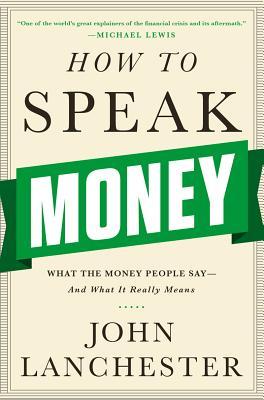Review: John Lanchester’s “How to Speak Money”
by Miles Raymer
Since I began listening to NPR’s Planet Money and the Slate Money podcast, I’ve hatched a significant desire to correct my deficiency in economic and financial knowledge. When I heard John Lanchester plugging his new book on the “Read These Books Edition” of Slate Money, I thought How to Speak Money would be a good starting point. Lanchester makes a strong effort to render the language of finance transparent for laypeople, throwing in some personal commentary along the way. Lanchester doesn’t feign political objectivity (he particularly enjoys prodding the neoliberal agenda), but he also devotes about 150 pages to a sensibly-written glossary of financial terms. Readers will find it a handy reference tool, if nothing else.
Learning to analyze financial language and economic arguments is a lifelong process, but without a certain foundational vocabulary, it seems impossible to even get started. Lanchester’s central goal is to demolish (or at least compromise) the linguistic and conceptual walls between the financially literate and the general public. “The language of money…” he writes, “is powerful and efficient; but it is also exclusive and excluding” (8). I can’t say I’ve completely overcome this obstacle after reading How to Speak Money, but I’m definitely more informed than I was.
One of this book’s most intriguing points concerns the relationship between the lexicon of money and morality:
The disagreements in economics aren’t just about technicalities: they’re usually based on profound divergences in moral analysis. In economics, though, the morality is buried below the surface of what you’re talking about. Morality and ethics are too basic, too fundamental to be given direct expression in economics. The language of money doesn’t express any implied moral perspective. Judgements of what’s right and wrong are left out. This can make the language seem abrasive, even shocking, to people habitually speak a different kind of discourse. Since much of the language of public life has an implied moral and political load, this makes money-speak very distinctive. (15-16)
I can understand the need for specialized terms that enable professionals to communicate directly and efficiently, but I don’t buy the claim that economic and financial lingo can be shaped and utilized without reference to any moral context. Money-speak is excellent for throwing up the illusion of amoral distance, but to claim that it truly achieves this goal is to overlook concrete outcomes of the Great Recession (and other economic debacles in history) for hardworking citizens whose betrayal by the financial sector has had costly consequences. To talk about money––whether chatting with a friend on your front porch or jabbering amongst hundreds of traders at the New York Stock Exchange––is to have an ethical discussion about the livelihoods of people, plain and simple.
Lanchester partially acknowledges this, even pointing out that those on the political left (such as myself) are especially sensitive to the supposed separation of money-speak and moral issues. As much as he aims to empower ordinary people, Lanchester also occasionally comes off as a financial apologist. Peculiarly, this apparent contradiction actually bolsters the book, because Lanchester can honestly walk the line between financial fanboy and outraged citizen. He understands that finance and economics are neither demonic practices benefiting only the wealthy elite nor structures that can properly function without enlightened regulation and––yes––moral guidance.
The most interesting idea in How to Speak Money is Lanchester’s concept of “reversification”: “A process in which words come, through a process of evolution and innovation, to have a meaning that is opposite to, or at least very different from, their initial sense” (19). Financiers can’t be accused of pioneering this practice, which has probably been occurring as long as language has existed; they should, however, be held accountable for generating particularly pernicious ways of twisting language to suit their needs, usually with the result––intentionally or not––of obfuscating meaning and redirecting criticism. Lanchester explores a slew of reversified terms, such as “Chinese wall,” “hedge fund,” “securitization,” “leverage,” and “bailout.” “[Reversification] is not a process intended to deceive,” Lanchester reminds us, “But the effect is much the same” (29).
Broadening public knowledge of money-speak can lessen the gap between regular folks and the financial sector, but much harsher measures will be necessary to rectify corporate abuses of public trust and funding, and also to address the fundamental economic inequalities that threaten the integrity of American democracy. I agree with Lanchester’s view that the neoliberal status quo, which he defines as “the intellectual force behind deregulation, free trade, privatization, lower taxes, and lower levels of state involvement in the economy,” is the opposite of what we need moving into the 21st century (177). Lanchester is correct that “arguments about the economy are going to dominate the next decade, and…arguments about fairness and inequality are going to be at the heart of those debates” (248). If books like this can help cross-pollinate the language of money with that of justice, science, and conscience, the debates and conflicts to come will be less savaged by avarice and ignorance than they are today.
Rating: 6/10
